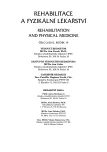-
Medical journals
- Career
The Process of Health State Evaluation for the Social Security Purposes
Authors: L. Čeledová 1; E. Vaňásková 2; R. Čevela 1
Authors‘ workplace: Odbor lékařské posudkové služby MPSV, Praha 1; Rehabilitační klinika LF UK a Fakultní nemocnice Hradec Králové 2
Published in: Rehabil. fyz. Lék., 19, 2012, No. 3, pp. 132-136.
Category: Original Papers
Overview
The article introduces the new medical assessment criteria for dependence degree assessment in relation to the social assistance allowance, as specified by the Social Services Law from 2012, the medical assessment criteria and the assessment process. The medical assessment criteria are fundamentally modeled according to the Activity of Daily Living (ADL) and selected principles of the International Classification of Functioning, Disability and Health (ICF). In the conclusion, the authors emphasize the role of the assessment service doctors in the process of assessing the dependence degree, and they also focus on the impact of the social assistance allowance, granted by the local employment office, on the quality of life of disabled people. Rehabilitation carried out by a complex work team contributes to the objectification of the functional potential and to the improvement of the source data for the assessment service.
Key words:
medical assessment service, dependence degree, social assistance allowance
Sources
1. Čeledová, L., Čevela, R.: Nové medicínské paradigma posuzování stupně závislosti pro účely příspěvku na péči. Časopis lékařů českých, roč. 150, 2011, č. 10, s. 550-553.
2. Čeledová, L., Čevela, R.: Koordinovanost ucelené rehabilitace. Praktický lékař, roč. 91, 2011, č. 11, s. 652-655.
3. Čevela, R., Čeledová, L.: Nové posuzování stupně závislosti dle principů mezinárodní klasifikace funkčních schopností, disability a zdraví. Kontakt, roč. 13, 2011, č. 3, s. 308-314.
4. Čeledová, L., Čevela, R.: Úloha posudkového lékaře a sociálního pracovníka v řízení o příspěvku na péči. Kontakt, roč. 13, 2011, č. 1, s. 48-53, ISSN1212-4117.
5. Kalvach, Z., Zadák, Z., Jirák, R., Zavázalová, H., Holmerová, I. a kol.: Geriatrické syndromy a geriatrický pacient. Grada Publishing, 2008, s. 336, ISBN 978-80-247-2490-4.
6. Mezinárodní klasifikace funkčních schopností, disability a zdraví. Grada Publishing, 2009, s. 280, ISBN 978-80-247-1587-2.
7. Seifert, B., Čeledová, L. a kol.: Základní pojmy praktického a posudkového lékařství. 1. vyd., Praha, Karolinum, 2012, s. 193, ISBN 978-80-246-2082-4.
8. Topinková, E., Neuwirth, J.: Geriatrie pro praktického lékaře. Grada Publishing, 1995, s. 299, ISBN 80 - 7196-099-6.
9. Topinková, E.: Geriatrie pro praxi. Galen, 2010, s. 270, ISBN 80-7262-365-6.
10. Vaňásková, E.: Testování v rehabilitační praxi - cévní mozkové příhody. 1. vyd., Brno, Národní centrum ošetřovatelství a nelékařských zdravotnických oborů, 2004, s. 65, ISBN 80-7013-398-8.
11. Vyhláška č. 505/2006 Sb., kterou se provádějí některá ustanovení zákona o sociálních službách, ve znění pozdějších předpisů.
12. Zákon č. 108/2006 Sb. o sociálních službách, ve znění pozdějších předpisů.
Labels
Physiotherapist, university degree Rehabilitation Sports medicine
Article was published inRehabilitation & Physical Medicine

2012 Issue 3-
All articles in this issue
- Changes in the Leg Locomotion at the Adult and Old Age in Comparison of Standing Position and Walking
- Coordination Dynamic Therapy Applied in the Syndrome of Painful Shoulder
- Sulfane as a New Gaseous Hormone – Importance for the RFM Branch
- Shiatsu in the Physiotherapy Context
- The Process of Health State Evaluation for the Social Security Purposes
- Physiotherapy of Patients with Multiple Sclerosis - Questionnaire Survey
- Comparing the Effects of Various Forms of Regeneration after Load by Myotonometry
- Rehabilitation & Physical Medicine
- Journal archive
- Current issue
- Online only
- About the journal
Most read in this issue- Sulfane as a New Gaseous Hormone – Importance for the RFM Branch
- Coordination Dynamic Therapy Applied in the Syndrome of Painful Shoulder
- Changes in the Leg Locomotion at the Adult and Old Age in Comparison of Standing Position and Walking
- Shiatsu in the Physiotherapy Context
Login#ADS_BOTTOM_SCRIPTS#Forgotten passwordEnter the email address that you registered with. We will send you instructions on how to set a new password.
- Career

